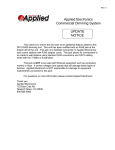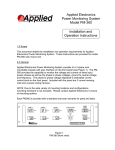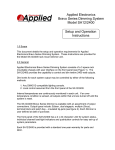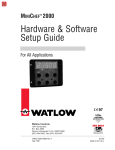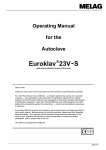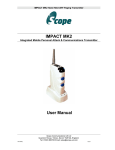Download SA12/2400 User Manual
Transcript
Applied Electronics Bravo Series Dimming System Rack-Mount Architectural Model SA12/2400A and Model SA12/2400E Setup and Operation Instructions 1.0 Scope This document details the setup and operation requirements for Applied Electronics Bravo Series Dimming System. These Instructions are provided for the Model SA12/2400A rack mount architectural dimmer unit. 2.0 General Applied Electronics Bravo Series Dimming System consists of a 3 space rack mountable chassis with user interface on the front panel (see Figure 1). The SA12/2400A provides the capability to control up to ninety-six 2400 watt outputs, with the use of expansion units (SA12/2400E). Dim levels for each system output may be controlled by any of the following methods: 1. Any DMX512-compatible lighting console. 2. Local control assumed from the front panel of the SA12/2400A. 3. Any Applied Electronics WP Series Wall Stations Internal temperatures are continuously monitored in each unit. If an over temperature condition is sensed, all outputs within that unit are turned off until the system is reset. The SA12/2400A Bravo Series Architectural Dimmer is available with terminal block output connections. Other types of output connectors are available on request. Each Dimmer is user defined at date of purchase. The front panel of the SA12/2400A has a 2 x 24 character LCD for system status, individual channel load-light indicators and pushbutton controls for easy set-up of system parameters (see figure 1). The SA12/2400E has only a Power indicator and an Over Temperature indicator (see figure 2). Each SA12/2400A and SA12/2400E is provided with a standard one-year warranty for parts and labor. 2 Figure 1 SA12/2400A (front view) Master Unit Figure 2 SA12/2400E (front view) Expansion Unit Applied Electronics • 722 Bluecrab Road • Newport News, VA 23606 • (800) 883-0008 3 Figure 3 SA12/2400A (rear view) Master Unit Figure 4 SA12/2400E (rear view) Expansion Unit Applied Electronics • 722 Bluecrab Road • Newport News, VA 23606 • (800) 883-0008 4 3.0 Specifications - Input Voltage: 220VAC (120VAC x 2) or 208VAC (3-phase) - Input Current: 240A per panel, supplied as 120A x 2 (for single phase sources) or 80A x 3 (for 3-phase sources) - Dimming Outputs: 12 channels @ 2400W (up to 60 channels w/ expansion dimmers) - Weight: 56 lbs. - Outside Dimensions: 5.22“ high x 19“ wide x 17.5“ deep - Operational Ambient Temperature: 32o to 104o F (0o to 40o C) 4.0 Chassis Mounting Each SA12/2400A and SA12/2400E dimmer unit is intended to be mounted in a standard 19” rack enclosure. Note that all dimmers are inherently noisy devices, and care should be taken not to mount the panels in a location where audible noise could be a distraction. For cooling considerations an exhaust fan for the Bravo Series dimmers is located on the left side (looking at the front of the unit). The right side of the dimmer has an intake fan. When mounted in a rack enclosure insure proper venting of each unit is allowed by having 2” diameter min. vent holes in rack side panel adjacent to the exhaust vent of the SA12/2400A (E). *Allow 6” minimum clearance between racks if two or more racks are to be located side-by-side Rear rack mounting rails are recommended for rear support of each dimmer unit. Rear mounting ears are available for the Bravo Series dimmers which will allow the unit to be secured to the rear mounting rails. 5.0 System Wiring Details The following sections detail control and power wiring requirements for the Bravo Series Dimmer Unit. 5.1 Power Input Connections for the Bravo Series Dimmer The Bravo Series Dimmer Unit may be configured for use with 3-phase or singlephase power sources. Your dimmer unit is normally shipped configured for three phase operation. In 3-phase mode, all blue wires marked with black and red tape should be connected to TB1 position 1 (second from right – from front of unit). In single-phase configuration, blue wires with black marking tape should be connected to TB1 position 3 (with other existing black wires) and blue wires with Applied Electronics • 722 Bluecrab Road • Newport News, VA 23606 • (800) 883-0008 5 red marking tape should be connected to TB1 position 2 (with other existing red wires). The resulting phase/channel assignments for each configuration are as follows: Configuration 3-Phase Single Phase 1 A A 2 B B 3 C B Channel Phase Assignment 4 5 6 7 8 9 A B C A B C A B A A B B 10 A A 11 B B 12 C A WARNING VERIFY THAT NO INPUT POWER IS BEING PROVIDED TO THE CHASSIS PRIOR TO MAKING THE FOLLOWING CONNECTIONS. System power input connections should be made in accordance with Figure 3 and as detailed below. Ground Neutral Phase A TB1 Phase B Phase C Figure 3 Power Input Connections Applied Electronics • 722 Bluecrab Road • Newport News, VA 23606 • (800) 883-0008 6 Ground Connection – Earth ground input should be connected to the .ground lug located next to the power input terminal block. Neutral Connection – Power Neutral input should be connected to TB1 position 4. Phase A Connection – Connect one phase of system power (hot) to TB1 position 1. Phase B Connection – Connect a second phase of system power (hot) to TB1 position 2. Phase C Connection – In 3-phase power systems, connect the third phase of system power (hot) to TB1 position 1. No connection required for single phase operation. 5.1 SA12/2400A (E) Control I/O Connections The SA12/2400A Bravo Series dimmer is controlled by industry standard (USITT), five pin DMX-512 control protocol. An industry standard five pin XLR connector is provided along with a DMX output (loop-thru) connector. It can also be controlled from any of Applied Electronics WP Series wall stations. Wall Plate connections are made to the SA12/2400A via an eight position terminal block. Wall Station connections are clearly labeled on the rear panel of the SA12/2400A. A 22 AWG, twisted two-pair cable with an internal shield is required for connecting the Wall Stations to the SA12/2400A. Each Wall Station is to be wired in series with the final termination on the rear panel of the SA12/2400A. The SA12/2400 also provides an alarm input for connection into a security system. A Normally Open and Normally Closed terminal is provided depending on the security system type. Alarm Input (N/C) – A normally closed alarm/panic switch may be connected to Common terminal and the Normally Closed terminal. Breaking the connection between these two terminals will cause all system outputs to go full ON. Note that the system is shipped with a jumper connecting these two positions. If this feature is used, remove this jumper and wire to the terminals as indicated. If this feature is not required, the factory-installed jumper should be left in place. Alarm Input (N/O) – If applicable, a normally open alarm/panic switch may be connected to TB1 positions 14-15. If this feature is not required, these terminals should be left unconnected. Applied Electronics • 722 Bluecrab Road • Newport News, VA 23606 • (800) 883-0008 7 WARNING VERIFY THAT NO INPUT POWER IS BEING PROVIDED TO THE CHASSIS PRIOR TO MAKING THE FOLLOWING CONNECTIONS. DMX Input – Connect any DMX512-compatible lighting console to the sidemounted 5-pin XLR connector using a standard DMX cable. The SA12/2400A is supplied with a six position XLR output connector for connections to expansion units (see figure 2). The system is expandable up to 96 channels total. Each expansion dimmer is provided with an input connector and an output connector for connecting control signaling between expansion units. All expansion dimmer should be connector together for the system to operate properly. 5.3 Power Output Connections for SA12/2400A Bravo Series Dimmer System power output connections should be made in accordance as detailed below. Hot Connections – Depending on the output connection type purchased, Hot wires for each output channel should be connected to the corresponding position on the rear panel as specified below. Terminal Block Output: The rear mounted terminal block provides a channel (hot) connection and a neutral connection for each channel output. Channel one is the terminal position to the furthest right and all other terminals are wired in sequence right to left. A position is provided for each Neutral connection for each channel. More than one lighting fixture may be connected to each output channel, as long as each channel’s load does not exceed 2400 watts. 6.0 System Setup After all system control and power wiring are connected as detailed in section 5 above, turn all 12 output channel circuit breakers OFF, turn your DMX-512 lighting console OFF and energize the system. The system front panel LCD display should display the following message for a few seconds: Applied Electronics • 722 Bluecrab Road • Newport News, VA 23606 • (800) 883-0008 8 Applied Electronics SA12/2400 Dimmer Output Mode Manual Override Preheat Adjust DMX Patch After initialization, the LCD will display the following system status screen: A:OK B:OK C:OK Valid DMX: No Valid DMX Input: NO Temp:NORM Base: 1 Base Output Mode Manual Override Preheat Adjust DMX Patch Note: If the system is powered by a single phase (220/240 VAC) source, the LCD will not display the “C: OK” message. With all sliders set to “0” or “OFF”, turn on the DMX512 lighting console. The status message should change to “Valid DMX Input: YES”. Applied Electronics • 722 Bluecrab Road • Newport News, VA 23606 • (800) 883-0008 9 6.1 Manual Override The Manual Override function allows the user to override DMX control input and adjust each output individually. Turn ON the front panel circuit breaker for Output Channel 1 (the leftmost breaker). The fixture connected to Output 1 should remain OFF. Press the front panel Manual Override button. The Manual Override LED should light, and the LCD will display the following: Chan: 01 02 03 04 05 06 Level: 00 00 00 00 00 00 Output Mode Manual Override Preheat Adjust DMX Patch The top row of numbers in the LCD display indicates channel output numbers. The bottom row indicates the current level of each output. A flashing cursor (shown in the figure with a gray background) indicates the current output channel. Press the UP and DOWN buttons to the left of the Manual Override switch to change the value of Output 1 from 0% to 100%. (Note: 100% level is displayed as “FL” for “Full” on the LCD display.) Verify that the lighting fixture(s) connected to Output 1 light and dim accordingly. To adjust another output channel, turn on the corresponding front panel circuit breaker, press the LEFT and RIGHT buttons to the left of the Manual Override switch to select the desired channel, then use the UP and DOWN buttons as above to adjust the output level. Repeat these steps until all output channels have been verified. Pressing the Manual Override switch again causes the associated LED to extinguish and the LCD to revert to the system status screen. Note that when the system is in normal usage, pressing the Manual Override button causes all outputs to freeze at their current levels (as set externally by the Applied Electronics • 722 Bluecrab Road • Newport News, VA 23606 • (800) 883-0008 10 DMX console or remote wallplates) until the channels are adjusted manually, or until the Manual Override switch is pressed again. When the system exits Manual Override mode, control is immediately returned to the external DMX control device. 6.2 DMX Patch The SA12/2400 DMX Patch function allows the user to adjust the base DMX address for the system. Adjusting this parameter is generally not necessary if the SA12/2400 system is the only dimmer connected to the DMX-512 console output. To adjust the DMX base address, press the DMX Patch switch on the system front panel. The DMX Patch LED lights and the following is displayed on the LCD screen: DMX Base Address: 1 Output Mode Manual Override Preheat Adjust DMX Patch Press UP and DOWN arrows to adjust the system DMX base address to the desired value. Press the DMX Patch again to return to the system status display. Note that the system does not respond to external DMX control signals while in DMX Patch mode. DMX Patch values are stored in non-volatile memory and are not lost in the case of a power outage. 6.3 Output Mode Applied Electronics • 722 Bluecrab Road • Newport News, VA 23606 • (800) 883-0008 11 The SA12/2400 Output Mode performs two important functions: (1) Channels may be set to operate in non-dimming mode (also called “switch” or “relay” mode), and (2) Channels may be grouped together so that changing the level on one channel changes the level on all channels equally. Press the Output Mode switch on the SA12/2400 front panel. The Output Mode LED should light, and the LCD will display the following: Chan: 01 Level: D 02 D 03 D 04 D 05 D Output Mode Manual Override 06 D Preheat Adjust DMX Patch The “D” under each output channel indicates that associated channel is set to “Dim” mode. This is the default operating mode for each channel. Pressing the UP button once changes the selected channel’s output mode to “S”, indicating “switch” mode. When an output channel is in Switch mode, the output level of that channel changes from OFF when the input control signal is at 50% or less, to full ON when the input level is set to greater than 50%. This feature allows non-dimmable (on/off) devices to be controlled by the dimming system. Pressing the UP button again changes the selected channel’s output mode to “<”, indicating that that channel’s level will track the level of the preceding channel. This feature is useful when it is preferable to use one channel level to control several outputs simultaneously, particularly in cases where a group of lights should always be at the same level but (because of their power consumption) must be assigned to several separate outputs. It also permits a single slider on a remote wallplate controller to raise and lower the brightness of a group of lights. Applied Electronics • 722 Bluecrab Road • Newport News, VA 23606 • (800) 883-0008 12 Consider the following sample display: Chan: 01 02 03 04 05 06 D/S: D < < < D D Output Mode Manual Override Preheat Adjust DMX Patch When set up as shown, Output Channels 1 through 4 will dim as determined by the input level for Channel 1, Channels 6 through 8 will dim as determined by the input level for Channel 6, and Channels 11 and 12 will switch ON and OFF as determined by the input level for Channel 11. Channels 5, 9, and 10 will operate independently of all other channels. Pressing Output Mode again causes the Output Mode LED to extinguish and the system status screen to be displayed. Output Mode settings are saved in nonvolatile memory and are not lost in the case of a power outage. 6.3 Preheat Adjust The SA12/2400A Preheat Adjust function allows users set to a minimum value for the output level of individual channels. This feature has two benefits: (1) Bulb life is extended for fixtures that are frequently taken from full OFF to full ON repeatedly, and (2) Bulbs reach full brightness more quickly when they begin with a small trickle current running through them. These benefits are most noticeable in fixtures that are used in “Chase” mode (see DMX lighting console instructions). To set preheat values, press Preheat Adjust on the system front panel. The Preheat Adjust LED should light, and the LCD will display the following: Applied Electronics • 722 Bluecrab Road • Newport News, VA 23606 • (800) 883-0008 13 Chan: Preht: 01 02 03 04 05 06 00 00 00 00 00 00 Output Mode Manual Override Preheat Adjust DMX Patch As in the other adjustment modes, the UP and DOWN buttons are used to set the desired Preheat level, and the RIGHT and LEFT buttons to select the channel to be adjusted. Note that Preheat levels for each channel may be set from 0% to 12% of maximum brightness. Preheat levels for grouped output channels all track the primary (lowest) channel’s value; preheat levels for the tracking channels are ignored. Preheat values for outputs set to “Switch” (ON/OFF) mode are also ignored. Pressing Preheat Adjust again causes the Preheat Adjust LED to extinguish and the system status screen to be displayed. Preheat Adjust settings are saved in non-volatile memory and are not lost in the case of a power outage. 7.0 Maintenance Issues When properly mounted and wired as specified herein, the SA12/2400 Bravo Series Dimmer system should provide years of trouble-free service. However, certain failure conditions may cause the unit to malfunction or cease operation completely. This section provides an overview of the most common failure conditions. 7.1 Excessive System Current Each SA12/2400 output channel is rated at 2400 watts, or 20 amps at 120 VAC. However, the total current rating of each panel is 80 amps per phase for a 3phase system, and 120 amps per leg for a single phase system. While each channel’s output current is supplied through a circuit breaker which limits that channels’ current to 20 amps, there is no internal master circuit breaker to ensure Applied Electronics • 722 Bluecrab Road • Newport News, VA 23606 • (800) 883-0008 14 that the system’s total current draw is within the specified limits. Before operating the system, be sure that power input lines are externally protected from an over current condition. 7.2 Thermal Overload Each SA12/2400A is supplied with thermal monitoring circuitry which continually monitors the unit’s internal temperature. If air pathways into or out of the chassis are blocked, if the unit’s side-mounted heat sinks are covered, or if the unit is mounted too close to nearby walls or heat sources (such as other dimmer panels), it is possible for the dimmer system to overheat. When an over temperature condition is sensed in the SA12/2400A, the LCD displays the following message: Over Temperature Turn Power Off to Reset Output Mode Manual Override Preheat Adjust DMX Patch Applied Electronics • 722 Bluecrab Road • Newport News, VA 23606 • (800) 883-0008














